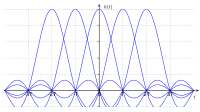
Photo from wikipedia
Through interacting with wireless environments continuously, continuous spectrum sensing (CSS) had been proposed in the literature to alleviate problems introduced by quiet periods in cognitive radio systems. However, in conventional… Click to show full abstract
Through interacting with wireless environments continuously, continuous spectrum sensing (CSS) had been proposed in the literature to alleviate problems introduced by quiet periods in cognitive radio systems. However, in conventional bandwidth-fixed CSS (BF-CSS) schemes, the precious and finite time-frequency resources are not sufficiently utilized. In this article, we design a bandwidth-adaptive CSS (BA-CSS) scheme to improve time-frequency resource utilization, and analyze its performance in terms of average delay, transmission throughput, and energy efficiency (EE). In our proposal, if a primary user is detected to be absent, a secondary user senses the sensing subband and transmits over the transmission subband; otherwise, it senses the entire frequency band, which consists of the sensing subband and the transmission subband. Based on a four-state Markov chain, we obtain the average number of spectrum opportunities, the probability of detection, and the probability of false alarm. Then, closed-form expressions for the average delay, the transmission throughput, and the EE are derived. We also obtain performance boundaries for the average delay and the transmission throughput. Both theoretical analysis and simulation results show that compared with the conventional BF-CSS, the proposed BA-CSS is able to improve both the delay performance and the throughput performance significantly with negligible decrease in EE.
Journal Title: IEEE Systems Journal
Year Published: 2022
Link to full text (if available)
Share on Social Media: Sign Up to like & get
recommendations!